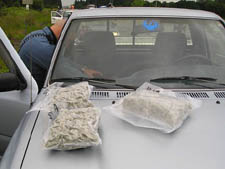Feature:
Portland
Initiative
Would
Make
Marijuana
"Lowest
Law
Enforcement
Priority"
3/17/06
Portland is gearing up to be the latest city to jump on the "lowest law enforcement initiative" bandwagon. A home-grown group, Safer Portland, announced last week that is has begun a signature-gathering drive to put an initiative on the November ballot that would make adult marijuana offenses the lowest law enforcement priority.
The Portland initiative is similar to successful measures such as Oakland's 2004 Proposition Z or Seattle's 2003 Initiative-75, with their lowest law enforcement priority language. It is also very close to four similar initiative efforts in the smaller cities of Missoula, Montana, and Santa Barbara, Santa Cruz, and San Mateo, California. If approved by voters, the measure would create a city ordinance making marijuana law enforcement aimed at adults the city's lowest law enforcement priority. The measure includes exceptions for offenses relating to minors, driving under the influence of marijuana, offenses occurring within a thousand feet of schools, offenses occurring on public property, and offenses occurring or private property or near businesses if the owner complains. "We are one of five cities working on the most cutting edge marijuana law reform project around," said Chris Iverson, campaign manager for Safer Portland. "It is a lowest law enforcement priority, but it's a hybrid. Instead of calling for personal possession to be the lowest priority, it's all marijuana offenses involving adults. People haven't yet figured out how all-encompassing that is. This kind of ordinance will allow for dispensaries, it will allow for cafes with smoking rooms, it will allow our culture to develop," he told DRCNet. "This is how legalization will come, by building the culture. Until then, I don't think we have a chance." The measure would bar Portland police and other city employees from being deputized or commissioned by the DEA if it would require them to participate in enforcement of marijuana laws against adults. It would also bar the city from accepting state or federal funds if such funds require that the city use them to enforce marijuana laws. The measure calls for the creation of a community oversight committee to monitor implementation of the ordinance and calls on police to submit reports on marijuana arrests in Portland on a regular basis. Finally, it requires the city of Portland to annually notify state and federal government representatives and officials that the city has deprioritized adult marijuana crimes and request "that the federal and Oregon state governments take immediate steps to legally tax and regulate marijuana use, cultivation, and distribution, and to authorize state and local communities to do the same." Portland could save big money by not arresting and prosecuting marijuana offenders. In 2003, the last year for which official Oregon statistics are available, Portland police arrested 117 people for crimes involving more than one ounce of marijuana and 832 people for possession of less than an ounce. Each offender processed through the Multnomah County Drug Court costs nearly $6,000, while each offender processed through regular court costs more than $7,000, according to the Oregon numbers. "That's almost $6 million a year coming out of the pocket of taxpayers in Portland alone," said Iverson, "and $60 million statewide. Once we win in Portland, we're looking at taking this statewide," he said. The Safer Portland campaign is largely being bankrolled by the Washington, DC-based Marijuana Policy Project, which has already awarded the group a $60,000 grant, with another $60,000 held in reserve. The group also aims to raise an additional $24,000 from other donors, Iverson said. "We couldn't have done this without MPP's help," he added. Like other West Coast metropolises, Portland has a well-deserved reputation as liberal, reform-friendly city. It has also shown itself skeptical of overweening law enforcement. The city is the first, and so far, only city to vote not to participate in a homeland security anti-terrorism task force, and the city's marijuana task force was disbanded, although Multnomah County has stepped in to carry the burden. "The city task force was a huge bust machine," said Iverson, "but the police here are very cool. They are professional and courteous -- except for shooting someone every once in awhile -- and all of the ones I've talked to would rather be going after violent criminals than pot-smokers, but their hands are tied. We want to free them from the burden of enforcing the marijuana laws." So far, the Portland police don't seem overly concerned about the initiative. "We don't comment on political issues," said Portland Police Bureau Lt. Paul Dolby when asked if the department approved or disapproved of the proposed initiative. "Whatever laws the citizens tell us to enforce, we enforce." Safer Portland is covering its bases with city officials and other opinion leaders, said Iverson. "We're already meeting with government officials, and it looks like all four city council members will endorse this, and perhaps even the mayor," he predicted. "It looks like we'll get some good grasstops endorsements as well." Media coverage so far has been minimal, and that's just fine with Safer Portland. "We're in sort of a stealth mode right now, and we are not really engaging the media. We're hoping that if we don't get too much coverage early on, we'll be able to get a lot of free media in the fall, when it's get out the vote time. In fact, I'd say right now I'm pleasantly surprised at the lack of coverage." That won't last, and opposition is bound to emerge, but right now, Safer Portland has the playing field to itself and a little less than four months to meet its signature drive goal. Come the dog days of summer, Portland could awaken from its torpor and begin to realize it is about to extend the margins of marijuana law reform just a bit further.
|

